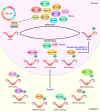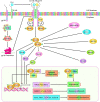A review on the role of cyclin dependent kinases in cancers
- PMID: 36266723
- PMCID: PMC9583502
- DOI: 10.1186/s12935-022-02747-z
A review on the role of cyclin dependent kinases in cancers
Abstract
The Cyclin-dependent kinase (CDK) class of serine/threonine kinases has crucial roles in the regulation of cell cycle transition and is mainly involved in the pathogenesis of cancers. The expression of CDKs is controlled by a complex regulatory network comprised of genetic and epigenetic mechanisms, which are dysregulated during the progression of cancer. The abnormal activation of CDKs results in uncontrolled cancer cell proliferation and the induction of cancer stem cell characteristics. The levels of CDKs can be utilized to predict the prognosis and treatment response of cancer patients, and further understanding of the function and underlying mechanisms of CDKs in human tumors would pave the way for future cancer therapies that effectively target CDKs. Defects in the regulation of cell cycle and mutations in the genes coding cell-cycle regulatory proteins lead to unrestrained proliferation of cells leading to formation of tumors. A number of treatment modalities have been designed to combat dysregulation of cell cycle through affecting expression or activity of CDKs. However, effective application of these methods in the clinical settings requires recognition of the role of CDKs in the progression of each type of cancer, their partners, their interactions with signaling pathways and the effects of suppression of these kinases on malignant features. Thus, we designed this literature search to summarize these findings at cellular level, as well as in vivo and clinical levels.
Keywords: CDK; Cancer; Cyclin dependent kinases.
© 2022. The Author(s).
Conflict of interest statement
The authors declare no competing interests.
Figures



References
Publication types
LinkOut - more resources
Full Text Sources

